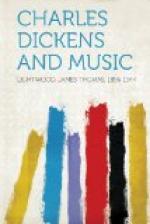The psalms were accompanied by a few instrumental performers, who were stationed in a small gallery extending across the church at the lower end; and the voices were led by the clerk, who, it was evident, derived no slight pride and gratification from this portion of the service.
But if the church music in England was not of a very high quality when Dickens wrote the above, it was, according to his own account, far superior to what he heard in certain churches in Italy. When in Rome he visited St. Peter’s, where he was quite unimpressed by the music.
I have been infinitely more affected in many English cathedrals when the organ has been playing, and in many English country churches when the congregation have been singing.
On another occasion he attended church at Genoa on a feast day, and he writes thus about the music:
The organ played away lustily, and a full band did the like; while a conductor, in a little gallery opposite the band, hammered away on the desk before him, with a scroll, and a tenor, without any voice, sang. The band played one way, the organ played another, the singer went a third, and the unfortunate conductor banged and banged, and flourished his scroll on some principle of his own; apparently well satisfied with the whole performance. I never did hear such a discordant din.
Parish Clerks
We have but few references to parish clerks in the novels. Mr. Wopsle (G.E.)—whom Mr. Andrew Lang calls ’one of the best of Dickens’ minor characters’—’punished the Amens tremendously,’[14] and when he gave out the psalms—always giving the whole verse—he looked all round the congregation first, as much as to say ’You have heard our friend overhead; oblige me with your opinion of this style.’ This gentleman subsequently became a ‘play-actor,’ but failed to achieve the success he desired. Solomon Daisy (B.R.) is bell-ringer and parish clerk of Chigwell, though we hear nothing of his exploits in these capacities. However, he must have been a familiar figure to the villagers as he stood in his little desk on the Sunday, giving out the psalms and leading the singing, because when in the rifled and dismantled Maypole he appeals to the poor witless old Willet as to whether he did not know him—
‘You know us, don’t you, Johnny?’ said the little clerk, rapping himself on the breast. ’Daisy, you know—Chigwell Church—bell-ringer—little desk on Sundays—eh, Johnny?’
Mr. Willet reflected for a
few moments, and then
muttered as it were mechanically:
’Let us sing to the
praise and glory of—’
‘Yes, to be sure,’
cried the little man hastily,
‘that’s it, that’s
me, Johnny.’
Besides the numerous body of more or less distinguished artists whom the novelist introduces to us and whose achievements are duly set forth in these pages, there are two others whose connexion with Cloisterham gives them a prominent position in our list. One of these is the Rev. Mr. Crisparkle (E.D.), Minor Canon of Cloisterham:




